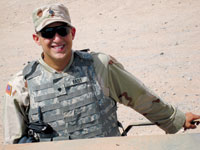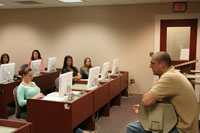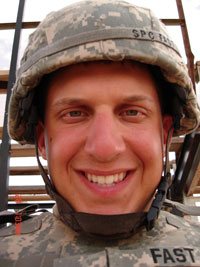Flagler student serves with Army in Iraq while completing his degree

By Brittany Hackett
A quiet night in Baghdad is shaken violently as a mortar explodes over a U.S. military compound. Troops jump from bed, gather up their gear and prepare themselves for whatever comes next.
While this might sound terrifying to civilians in the safety of the U.S., it’s just another night of ruined sleep for Army Reservist and Flagler College student Matt Fast who is stationed in the Iraqi capital.
It wasn’t that long ago that Fast was a normal college kid spending his time going to class, hanging out with friends and getting a full night’s sleep. But since being called up to active duty in Iraq, the Military Police Officer now works 12-hour shifts at Baghdad Central Facility, a military prison that houses high value targets.
He spends his days, from 2 a.m. to 2 p.m., in front of a computer organizing evidence files of prison detainees for the Pentagon, FBI and CIA. While he’s proud of the work the military is doing, it can also get frustrating cooped up in an office.
“Working in the prison is terrible,” he said during a two-week leave back to St. Augustine in February when he also returned to Flagler for a visit. “It’s like Groundhog Day every single day. I would have never thought I would be doing this, but I am working on a computer 12 hours a day, 6 days a week.”
The detainees in the prison are arrested for illegal weapons possession, attacking Coalition forces, funding terrorists and any number of other offenses. Fast says that one in every 10 is under the age of 18 and that he’s seen kids as young as 12 in the prison.
When they are arrested and brought to the facility, they are charged but rarely convicted of the crimes. According to Fast, most detainees are released back into the communities they came from.
“We capture like 1,500 people a month is what it’s been recently on average, and I think they convict like 10 right now,” he said.
He recalls when a 23-year-old Iraqi was brought in to the prison, wanted for murder and explosive discharge in a town or city.
“He was a kid pretty much,” Fast said. “He attended Baghdad University. He was majoring in architecture and all that good stuff. This guy is clearly guilty because there was all this stuff in his folder that just points that he’s guilty. And so he comes in to me and I’m like, ‘You’ve got to be kidding me? You’re getting released?’ (He’s) getting released because he’s got finals at Baghdad University.”
It’s frustrating situations like this that causes Fast to worry about how much progress the military is making in Iraq, especially with all the corruption he sees in the Iraqi government making is difficult to convict detainees.
“Unfortunately all the people are prosecuted in Iraqi courts with Iraqi judges and Iraqi juries. Everything is Iraqi involved. All we do is we pretty much sacrifice our lives and bodies to escort them to these courts.”
Fast’s sacrifice began in 2003 when he joined the Reserves straight out of high school. He entered Flagler College in 2004, and was called to serve in the war in 2006. He is now taking 18 credit hours through American Military University online, which the Army pays for, and is on track to graduate with a psychology degree from Flagler in Spring 2008.
“I knew there was a possibility (he would be called up), but we always joked that he wasn’t allowed to go (because he’s in college),” said Flagler junior Mallory Needleman, Fast’s girlfriend of almost two years.
On Oct. 3, 2006, Fast landed in Iraq thinking his unit would be doing convoy security for the troops who bring food and aid to the people of Baghdad. Instead, he was assigned to his job at the prison because he had a college background.
“I thought I was going to be on the roads, like experiencing life threatening stuff everyday,” he said. “Call me crazy, but I didn’t join the Army to sit in a prison office all day typing on the computer. It kills me.”

Because Fast is enrolled in college as a reservist, he had the option to not go to Iraq with his unit and continue with school instead. But he couldn’t be talked out of going.
“There was no way I was going to say no,” Fast said. “I went though basic training with all my buddies from my unit, I’ve been part of my unit for three years with the same guys who are my age over there. I wanted to be part of the war with those guys. I love them. They’re some of my best friends.”
And even though his duties in Iraq haven’t been as intense as he hopes they would be, Fast says that he is happy to have the opportunity to be in Baghdad.
“It’s something I enjoy,” he said. “What I get to see, though, is pretty intense because I actually see how it unfolds.”
Most of Fast’s work is done at the prison, but he does get the opportunity to go into Baghdad City to deliver detainees to the Iraqi authorities at the Iraqi Correctional Prison. He describes it “like a landfill on every single road” because of neglect and damage from years of war and insurgency.
“One time I went on this convoy into Baghdad City I was taking three convicted juveniles who were not even 16 to this, it’s not even like a prison. It’s pretty much a building with no windows and a bunch of what looks like dead dogs all over the road, but they’re just sleeping,” he said. “We pull up to this place and it’s supposed to be a bunch of kids all over the place who were supposed to be convicted, but it’s so silent, there’s nobody there. You can just tell it’s bad.”
“I had my interpreter with me and I take these kids there and the first thing I see when I walk in to this warden’s office is just this huge looking mob looking guy, like mafia looking Iraqi holding an AK-47. I didn’t feel safe at all and he’s supposed to be on my side.”
Although he has never been in a fire fight, Fast has been mortared, something he calls “pretty terrifying” and that happens about once a week.
It’s something he shakes off as something he just has had to deal with.
“You have no choice,” he said. “Your body adapts to anything.”
Fast’s job in the prison provides him with constant Internet access so he is able to stay in contact with his family, friends, and his girlfriend through e-mail and phone calls. Soldiers on patrol don’t have this luxury.
“When I watch the news I kind of picture Matt not in Baghdad, not in Iraq,” Needleman said. “I see it as not even effecting him. But it’s when we don’t have the constant communication, when he’s not online for two days, when he hasn’t called me in three days, that’s when I get worried.”
Fast has had some positive experiences in Iraq amidst all the negative ones that go along with war.
“The Iraqi people love us,” he said. “The few times I’ve been out in Baghdad, it’s so cool and I’m sure it’s the natural thing you see on the news all the time, a soldier crowded around by a bunch of kids.”
Fast says that soldiers always brings toys for the Iraqi children when they go into the city. “I just go up to the group of kids and I pull out my football and soccer ball and they just went crazy,” he said. “It’s pretty cool stuff. ”
While back in the States, Fast was able to spend time with Needleman, his parents, and his friends from Flagler. He said that it was like nothing had changed.
“I don’t think I’m a different person and they’re not different people,” he said. “You just appreciate it more, like not having to worry about so much stupid stuff.”
But even though Fast’s work in Iraq is mentally and physically exhausting, he doesn’t believe the U.S. should pull out of Iraq since there is still so much left to do.
“If I had to say what our mission was I would say to hunt down all these terrorists and help Iraq stabilize itself from all the surrounding countries and all the corrupt things going on over there,” he said. “Me and the Army have a love-hate relationship. I feel blessed that I get to go over there.”


